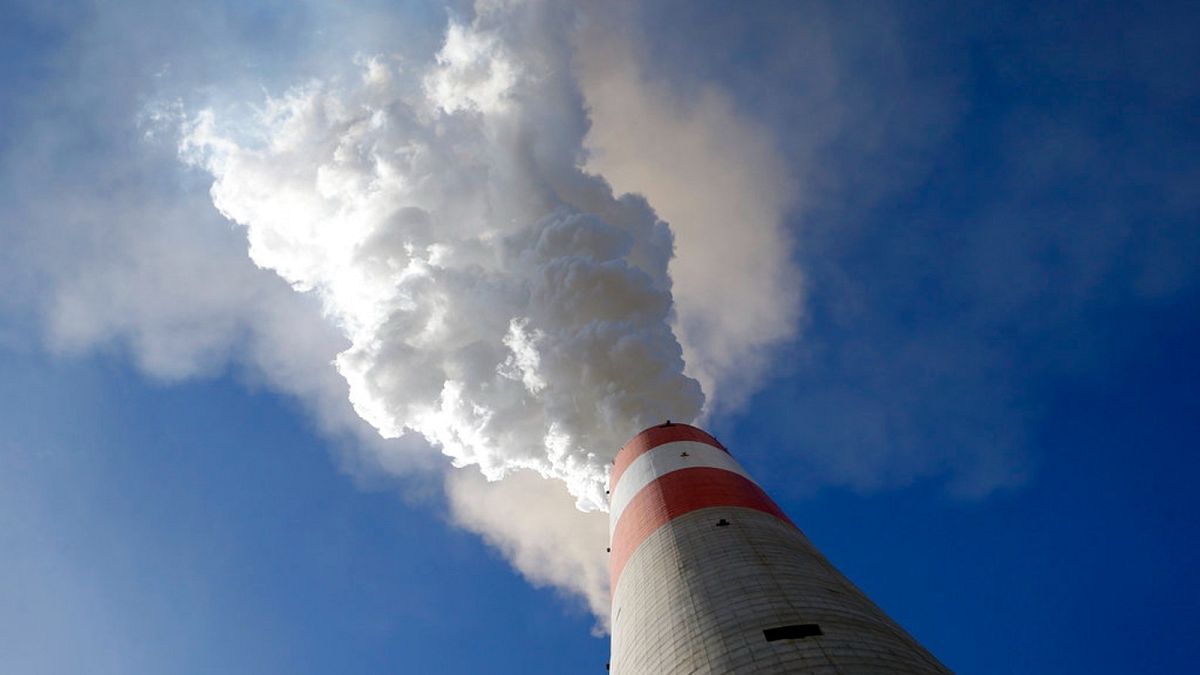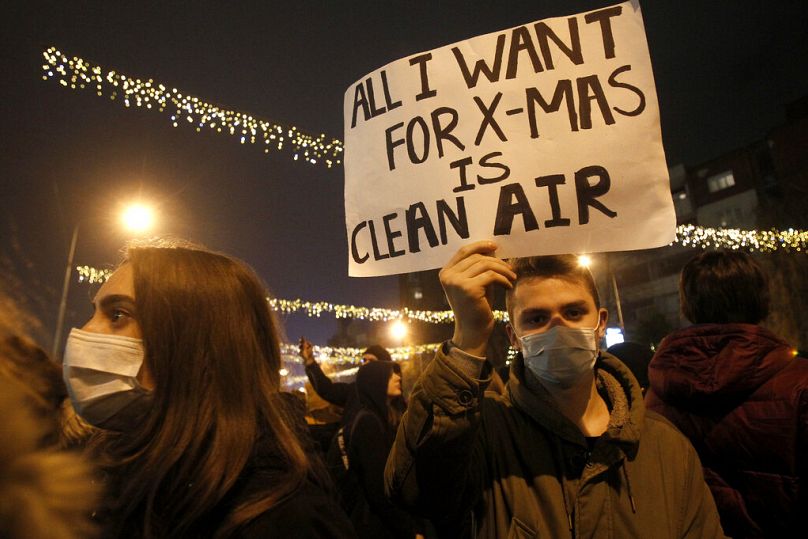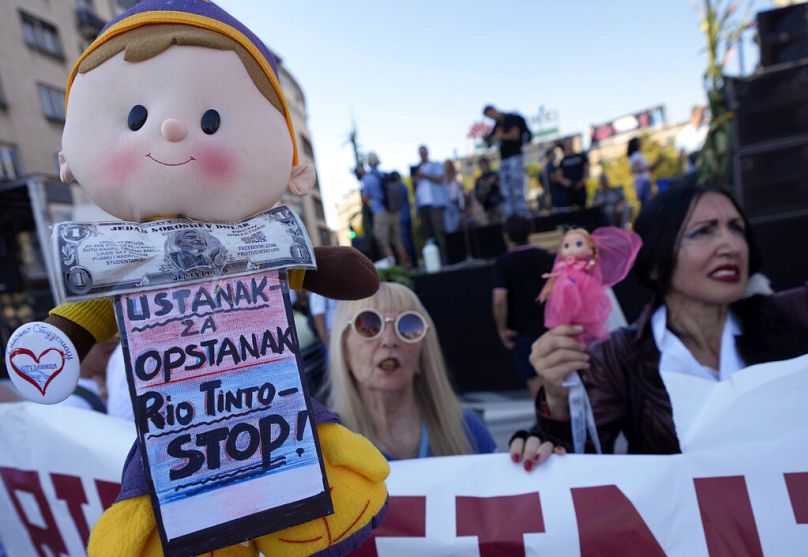“Heavy industries were the pride of socialist countries and economies, and this feeling persists.”
The tall smokestacks of factories oozing thick clouds of dark smoke litter the landscapes of central, southern and eastern European countries.
Built during 20th-century communism, they were – and in some cases continue to be – treasured assets that put countries on track with global modernisation trends and provided millions of jobs,
They were the subject of songs and poems children learned in school and propaganda posters, such was the importance of industry as a vehicle for political and economic progress.
“Heavy industries were the pride of socialist countries and economies, and this feeling persists,” explains Janez Kopač, the director of the Secretariat of the Energy Community, an organisation set up to link EU energy priorities with southeast Europe.
Decades later, countries from North Macedonia to Ukraine -- including states that came out of former Yugoslavia such as Serbia, Bosnia & Herzegovina and Kosovo -- now find themselves regularly topping lists of Europe’s biggest polluters, almost exclusively because of the industry built during communism.
According to Bankwatch, a network of environmental NGOs based in Prague, in the last three years coal plants found in southeast Europe have spewed out six times as much sulphur dioxide as permitted and caused nearly 12,000 deaths – about 3,700 in the Western Balkans and around 7,000 in neighbouring EU countries.
“Sorely required reform keeps being delayed over and over again, in what I describe as milking the old system until the bitter end,” says Kopač.
“That, combined with limited pressure on these countries to restructure their industries is one of the main sources of the problems they face today.”
Climate change is seen as a 'Western fad'
At a time when most political parties in Europe have adopted at least a partial green agenda, climate change continues to be a marginal issue in eastern and southeast European countries.
“Climate change is seen as a Western thing, so since nobody here is guilty for the destruction of the planet as much as China and the US and the West, people feel this is not something they should be worried about,” says Igor Štiks, a philosopher who has written extensively about the social and political aspects of post-communist transition, including the mismatch in rhetoric and goals between the East and the West.
Shock therapy transition from mainly centralised to free-market economies in the 1990s that produced massive income inequality in former socialist countries has led to wide swathes of the population – especially those who did not benefit from the privatisation of public enterprises – to cling to their jobs and disregard environmental concerns.
“It’s really hypocritical if people coming from the richer countries are accusing the poor for simply wanting to survive and preserve their workplaces,” explains Štiks.
“So apart from high school kids who could be inspired by Greta Thunberg and so on, it is not seen as a crucial political issue. It’s pretty much okay, forget about the planet, let’s see how we can survive since we decided to live here.”
From socialist Disneyland to environmental hell
Zrenjanin, a city in northern Serbia, used to be one of those communities that saw immense development during socialism and benefitted from the industrialisation spurred by government subsidies.
“Zrenjanin used to be one of the most industrially developed cities in the former Yugoslavia,” explains Dušan Kokot, the head of the Građanski Preokret (Civic Turnaround) organisation.
“As such, the transition affected it in a much more intense way. Over 60 companies with at least 500 employees don’t exist anymore. Now the biggest company in Zrenjanin is Drexel-Mayer, which produces automobile cables.”
Nowadays, Zrenjanin is known for being the city in Serbia with the highest measured levels of arsenic in its water supply, derived from contaminated underground sources. In 2004, the municipality advised inhabitants not to drink the tap water because of the toxic levels of arsenic, often dozens of times higher than the recommended level by the World Health Organization.
The city is found on the Pannonian Basin, which used to be a sea stretching over modern-day Croatia, Serbia and Hungary in ancient times. When it dried out, the sediment deposited in its bedrocks accumulated inorganic arsenic which was either unknown to or unreported by the government when the first bores were installed to extract water.
So when news broke in 2021 that a tyre factory would be built in the city by the Chinese company Linglong, locals feared the pollution levels caused by the hazardous byproducts of tire production would make their lives and health even more precarious.
“There are very few places -- if any -- in Serbia that are not affected by the transition industries and the lack of consideration for local and environmental needs. The reason we have all these problems is because the institutions that should work in the best interests of their citizens actually work for their own or the interests of investors,” explains Kokot, who says that the city and central government should have dealt with an existing environmental problem instead of causing another one.
“I think the majority is aware that those in power – even those in power they vote for – are destroying the environment they live in.”
Yet few, if any, protest with Kokot and others against the plant.
“Fear is a big part of the equation. People will come up to me and pat me on the back, say they support me and thank me for what I’m doing. But they don’t have the bravery to risk their lives and jobs to become as actively involved as they would like to be.”
“This has led to citizens themselves not actually pushing or expecting the solutions to come from the government or institutions,” says Kokot. “This says a lot about the path this city is on, but also the path our society as a whole is on. We don’t care about the things we used to care about. Instead, we have become a source of cheap labour.”
Is the region the EU’s environmental dump site?
Kopač explains that while local inspectors and governments are to blame for the lack of progress in curtailing emissions, EU demand for cheaper energy imports from these areas is also to blame.
“The price of CO2 in the European Union is rising sharply, which is at about 65 euros per ton. All the coal-based energy producers in the region that are publicly owned who export electricity to the EU or who sell it at the open market for the domestic market and businesses make extraordinary profits,” explains Kopač.
The social cost of carbon sets a monetary value in the present time for the future harm that carbon emissions could inflict. It allows policymakers to be able to predict the damage and weigh the cost and benefits of maintaining a certain level of emissions. While the EU might currently not be able to force the governments to take emissions seriously, importing energy from these countries incentivises them to not change their policies.
Kopač explains that this approach is known as being akin to environmental dumping by “producing at a lower cost compared to competitors and with lower regulations.” Environmental dumping is usually referred to as the practice of exporting waste produced from a country with strict environmental laws to one where they are not strictly enforced. By using the energy in the EU and “transferring” the emissions burden to a non-EU country, the EU is participating in a form of environmental dumping, says Kopač.
Yet this still increases the global emission of greenhouse gases – unlike, say, the disposal of industrial waste in another country. “Carbon leakage has become almost the most profitable business in the region,” he says. “That’s also why urgently needed reforms seem less urgent – even though this won’t last forever. The pressure for restructuring the industry that has existed for some time in Western Europe does not exist in these countries,” concludes Kopač.
Certain EU industries that have capped the emissions ceiling set by the Emissions Trading System move their production to a neighbouring non-EU country to reduce the costs of production as well as circumvent the carbon ceiling.
“On a yearly basis, the EU puts a cap on the emissions certain industries can emit. Within this, the industries either produce to their limit or produce less, or they buy the right to emit from other stakeholders in the industry but they can not go over the cap set by the ETS,” explains Viktor Berishaj, Energy Policy Coordinator for South-East Europe at Climate Action Network.
“Western Balkan countries, apart from Montenegro, do not have any carbon cap or tax. In this regard, there is a potential for some EU businesses or industries to look for a cheaper place to produce their goods. So this is how the EU leaks its emissions to its periphery,” he explains.
There are proposals now that foresee taxes for the carbon footprint of cars, which would be taxed as well and included in the price of the import. The final price would reflect that, bringing the price up to something similar to what is produced in the EU.
With regard to energy and electricity specifically, which in the Balkans is produced mainly through extremely outdated and inefficient coal plants, the EU has proposed a carbon border adjustment mechanism as part of its push to reduce emissions.
“The amount of energy imported to the EU is relatively low, at around one per cent, and includes imports from the Western Balkans, as well as countries such as Morocco, Ukraine, Georgia and Moldova. While this isn’t a huge problem for the EU, it would incentivise its neighbours to apply a carbon tax on their products, which include the electricity industry, steel, fertilisers and cement.
"So while electricity on its own might not be a big deal, it could have a much larger effect when all these polluting industries are combined,” says Berishaj.
Can climate change be politicised?
For Štiks, while he acknowledges the increase in ecological movements in the region – such as the new mayor of Zagreb or ecological movements in Serbia – he says that they are a reaction of things that are happening and not “a product of agreed thinking or classical political mobilisation.”
“An interesting fact is those are not uniform movements in their ideological outlook, and we can see that the struggle for the natural environment is populated by people of various ideological stripes,” he observes.
In certain places, these movements are clearly left-wing, such as in Slovenia and Croatia. In Bulgaria, Romania and to some extent in Serbia they “could also be led by nationalists who want to preserve their land and its purity — literally, ‘blood and soil’, and we could see in the recent demonstration in Belgrade that left-wing or progressive speakers were pretty much mixed with hardcore nationalists who want to preserve ‘the land of the people,’” he says.
On September 11, thousands gathered in central Belgrade in front of the national parliament as part of a protest called an “ecological uprising for survival.” The protests included around 60 environmental organisations mainly from Serbia but also the wider region, demanding a concerted government response to environmental concerns caused by ageing power plants and water systems.
One of the speakers during the protest referred to Dragoljub Draža Mihailović, a Serb guerilla leader who collaborated with the Nazis during World War II.
“So you can see this an anti-elite movement, but obviously they don’t have the same ideological or starting position. The danger is this nationalistic part. All of these activists apart from some progressive actors cannot link their struggle as a struggle for the preservation of the planet. No, it’s a struggle for the preservation of their own country, so it's inherently nationalist and not climate-oriented,” warns Štiks.
The flipside of those who might be spurred to climate action for nationalist aims are those who perceive climate issues as something not equally important as other political issues.
“Many see climate as a depoliticising exercise. Aren’t we all for the protection of our planet, right? Some people see it as being in stark contrast to issues that provoke conflict or different visions of how we see our society and the world,” he continues.
When something is depoliticised, it gets taken out of the realm of politics or the realm of things that need to be solved by politics. “The depoliticisation of climate change is a serious problem. When you present it as something abstract then you can’t do anything about it, especially if you live in the periphery, where it certainly isn’t going to play a big role.”
By making it a political issue that is equally important to other ones, citizens will react as they do to other political issues – by protesting, requesting action from their representatives and voting for those who will deliver it.
“Because if we start talking about the real consequences of climate change, such as migration, extinction of species, conflict, the issue will become politicised,” Štiks said.
“We will come to the realisation that not everyone is equally affected and that the poorest strata is affected the most, and that also we have to arrange our societies differently in order to be able to survive the shocks that are certainly coming.”




